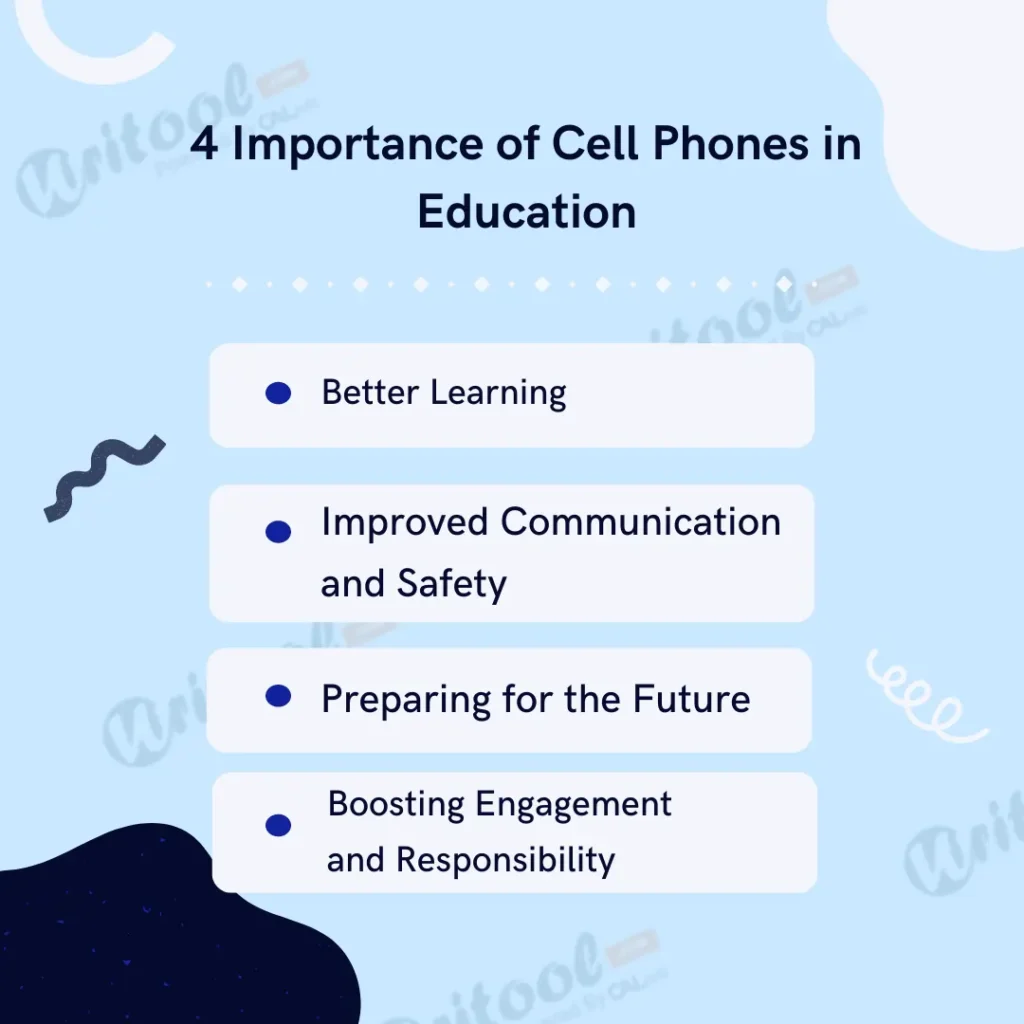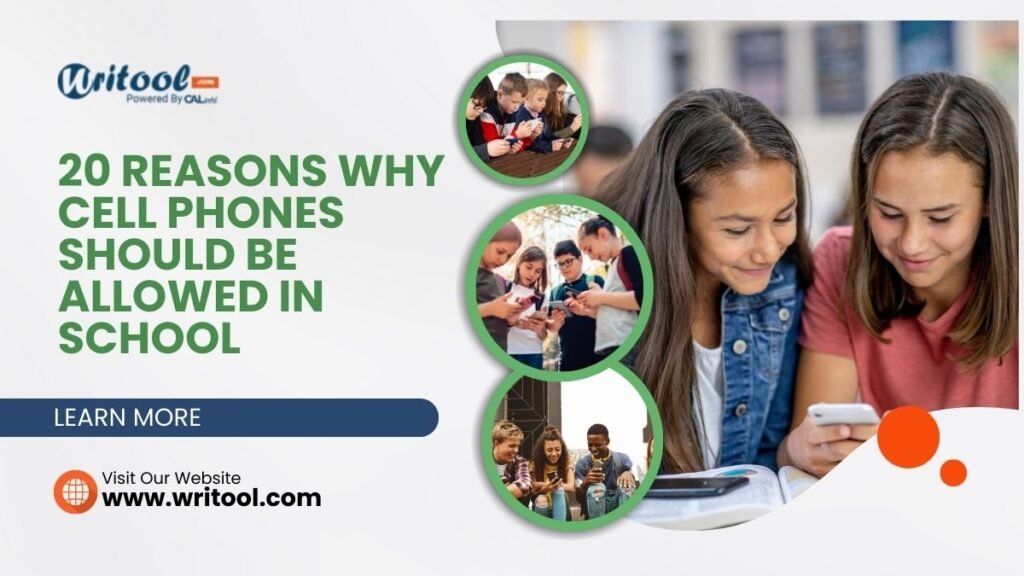Check out 20 reasons why cell phones should be allowed in school! Empowering Education! From making learning more fun to helping students stay connected, see why they’re a smart addition to classrooms!
Hey there! Ever wondered if cell phones could actually benefit schools? It’s a hot topic! Some think they’re trouble, but others think they could make learning even better. In this article, we’ll give you 20 reasons why having cell phones in school might just be awesome.
From adding excitement to lessons to keeping students in touch, there are tons of ways they could make education cooler. So, let’s jump in and find out why having your phone in class could be a smart move!
20 Reasons Why Cell Phones Should Be Allowed in School
Check out the 20 reasons why cell phones should be allowed in school:-
1. Refined Access to Information
Ever found yourself in a heated debate with pals about who clinched the World Series in ’95 or the lead actor in that movie you caught last week? Your phone swoops in like a superhero with all the answers. Remember that pizza place squabble? A quick search crowned Giovanni’s the undisputed champ.
2. Enhanced Organization
Forgetfulness is human, but with your phone, it’s like having a personal assistant on standby. Setting a reminder for your buddy’s birthday bash saved you from missing out on cake and presents – crisis averted!
3. Streamlined Collaboration
Group projects can be a breeze or a nightmare, but with your phone, coordinating is a cinch. Remember that history presentation? No more phone tag; a quick group chat got everything sorted in minutes – teamwork FTW!
4. Efficient Research
Say goodbye to dusty library digs. Your phone is your personal library, brimming with info at your fingertips. Researching climate change while lounging in bed? Done and done.
5. Portable Learning Materials
Why lug around hefty textbooks when everything you need is on your phone? Picture this: chilling in the park, flipping through your history textbook, soaking up sunshine – learning, redefined.
6. Life Skill Acquisition
Your phone isn’t just for messaging and socials – it’s a powerhouse for mastering crucial life skills. Crafting a polished email to request time off? Nailed it – adulting unlocked!
7. Seamless Parental Communication
Need a lift from soccer practice or a reminder for that dentist appointment? Your phone keeps you connected with the ‘rents. Texting mom for a ride? She’s there right on time – your phone, the ultimate chauffeur.
8. Safety Assurance
Beyond selfies and TikToks, your phone is your safety net. Walking home alone and feeling uneasy? Having your phone in hand offers peace of mind – safety always comes first.
9. Timely Emergency Alerts
Snow day? School lockdown? Your phone keeps you informed. Waking up to a text about a canceled school day due to snow? Best. Morning. Ever.
10. Digital Literacy
Navigating the web can be daunting, but your phone is your trusty guide. Remember learning to spot fake news and safeguard privacy? Suddenly, the internet’s not so intimidating.
11. Personalized Learning
We all learn differently, and your phone caters to your style. Struggling with math? An app explains it in a way that clicks – math whiz in the making!
12. Language Acquisition
Dreaming of Euro adventures? Your phone helps you learn the lingo. Practicing Italian for that trip to Rome? Molto bene!
13. Creative Outlet
Banish boredom with your phone’s creativity apps. Turning a selfie into art with a photo editor? You didn’t just kill time – you unleashed your inner Picasso.
14. Accessibility Empowerment
Your phone is a magic wand for students with disabilities. From screen readers to accessing textbooks, it levels the playing field – tech triumphs!
15. Parental Engagement
Keep your folks in the loop with your phone. Sharing your triumphs, like acing that math test, earns you virtual high-fives – parents love hearing about your wins!
16. Effective Time Management
Juggling school, sports, and Netflix binges? Your phone’s apps make you the master of your schedule. Setting a study timer and sticking to it? Your own personal cheerleader spurring you to productivity.
17. Global Connectivity
Your phone isn’t just for texting friends – it’s a gateway to global friendships. Video chatting with peers worldwide reveals we’re all teens, just with different accents.
18. Digital Citizenship Mastery
Learning online responsibility is like riding a bike – daunting at first, but rewarding. Spotting scams and safeguarding privacy? You’re now an internet savvy pro!
19. Career Preparedness
Beyond Instagram scrolling, your phone is your secret weapon for future prep. Crafting a stellar portfolio showcasing your skills? Suddenly, landing that dream job feels within reach.
20. Learning Flexibility
Education isn’t confined to classrooms – it’s everywhere. Watching a documentary while waiting for a friend? Learning feels more like fun than work – education, reimagined.
Importance of Cell Phones in Education
Check out the importance of cell phones in education:-

Better Learning
- Easy Info: Students can find things quickly online.
- Quick Research: Phones help students learn fast.
- Work Together: Apps make group projects simple.
- Fun Learning: Games and apps make learning fun.
Improved Communication and Safety
- Stay Connected: Students can talk to parents easily.
- School News: Schools can share updates fast.
- Feel Safe: Phones give a sense of security.
- Get Help: Students can find support online.
Preparing for the Future
- Tech Skills: Phones teach students to use technology.
- Modern Skills: Phones help students think better.
- Ready for Tomorrow: Knowing phones helps in the future.
Boosting Engagement and Responsibility
- Personal Learning: Apps fit each student’s style.
- Explore Interests: Students can learn about what they like.
- Fun Learning: Games and videos make learning fun.
- Learn to Be Responsible: With rules, students use phones wisely.
Remember: Simple rules and teaching help students use phones smartly for a better education.
Benefits of Cell Phones for Students
Students can gain many benefits from using cell phones responsibly in school. Here’s why it’s a good idea:
Better Learning
- Easy Access: Students can find lots of helpful info online.
- Quick Research: Phones help students learn fast.
- Work Together: Apps make group work easy.
- Fun Learning: Games and apps make learning enjoyable.
Improved Communication and Safety
- Stay Connected: Students can talk to parents easily.
- School News: Schools can share updates quickly.
- Feel Safe: Phones provide security in emergencies.
- Get Help: Students can find support online.
Preparing for the Future
- Tech Skills: Using phones teaches digital citizenship.
- Modern Skills: Phones help students think better.
- Ready for Tomorrow: Knowing phones helps in the future.
Boosting Engagement and Responsibility
- Personal Learning: Apps fit each student’s style.
- Explore Interests: Students can learn about what they like.
- Fun Learning: Games and videos make learning fun.
- Learn to Be Responsible: With rules, students use phones wisely.
Remember: Responsible use is key. Schools should set clear rules, teach digital responsibility, and train students and teachers for the best use of cell phones in education.
Why should a cell phone be allowed in school?
Check out why should a cell phone be allowed in school:-
Educational Benefits
- More Resources: Students access ebooks, websites, and videos.
- Better Research: Phones help with fact-checking and online learning.
- Collaboration: Apps aid teamwork on projects.
- Fun Learning: Interactive apps make studying enjoyable.
Communication and Safety
- Stay Connected: Students easily talk to parents.
- School Updates: Schools share news quickly.
- Safety: Phones provide security in emergencies.
- Mental Health Support: Students find help easily.
Preparing for the Future
- Digital Skills: Phones teach online safety and communication.
- Modern Skills: Students learn critical thinking.
- Readiness: Using phones prepares students for jobs and college.
Engagement and Responsibility
- Personal Learning: Apps fit different learning styles.
- Self-Directed Learning: Students explore interests.
- Engagement: Games and apps make studying fun.
- Responsibility: Clear rules teach students to use phones wisely.
In summary, allowing cell phones in schools can improve learning and prepare students for the future if used responsibly.
What are 5 reasons phones should not be allowed in school?
- Distraction: Phones divert students’ attention from learning.
- Cheating: Easy internet access can lead to dishonesty.
- Cyberbullying: Phones enable hurtful behavior.
- Mental Health: Excessive use can harm well-being.
- Equity: Not all students have equal access.
Despite these concerns, schools can take steps to address them, like creating phone-free zones. However, the decision remains complex.
How are cell phones useful in emergencies at school?
Cell phones help in school emergencies by:
- Calling for Help: Students and staff can quickly call 911 or emergency numbers.
- Updating Parents: Students can text or call parents to inform them.
- Coordinating Response: Teachers and staff can communicate better.
- Documenting the Situation: Phones can take pictures or videos.
- Getting Information: Students and staff can check the news.
It’s important to have clear rules, practice drills, and backup communication plans. Overall, phones are a great tool for safety during school emergencies.
Should phones be allowed in school debates?
Phones in school debates have good and bad sides:
Good
- Easy Research: Phones help find info fast.
- Visuals: Show images and videos easily.
- Stay Organized: Use apps to stay on track.
- Fair Access: Everyone can use phones, so it’s fair.
Bad
- Distractions: Phones can be distracting.
- Tech Issues: Sometimes phones don’t work right.
- Cheating: Students might cheat using phones.
- Bad Behavior: Cyberbullying can happen.
Balance
- Clear Rules: Set rules for phone use.
- Focus on Learning: Use phones for research only.
- Be Respectful: Encourage good behavior.
- Try Other Ways: If phones cause problems, try something else.
Conclusion
So, in a nutshell, letting students use cell phones in school can be a game-changer. It helps them learn better, communicate easier, and collaborate smoother.
By setting some ground rules, schools can tap into the potential of cell phones for a more exciting learning journey. It’s all about embracing tech smartly to prep students for the digital age ahead.


